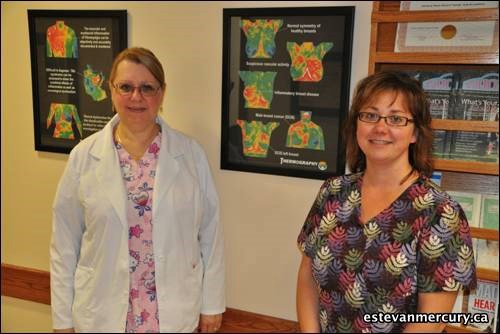With breast cancer continuing to be found in younger women every day, early detection is becoming the best tool to surviving the dreaded disease.
As the country somberly recognizes Breast Cancer Awareness Week, one of the themes of this important occasion is that early detection saves lives.
Although the commonly accepted belief is that breast cancer only affects women in their 40s and 50s, studies are proving that the disease is becoming more prevelant in women in their 20s and 30s.
Connie Davis of Grassroots Natural Health and Wellness, a business that specializes in using thermography to find diseases such as breast cancer in its early stages, says she has noticed a definite trend with respect to age.
"The incidence of breast cancer in young women is on the rise," she said. "There are a lot of women being diagnosed in their 30s and 40s."
Davis noted there a number of ways people can have themselves screened for cancer. She became involved in thermography after losing her sister to the disease and learning that early detection might have saved her life.
"She was diagnosed in her mid 40s and she was at Stage 4 so that meant the cancer had been growing there for at least 10 years," she said. "Because mammograms aren't started for breast cancer until age 50, a lot of women will be diagnosed with cancer without ever having been examined.
"Thermography, because there is no radiation or compression of the breast, is 100 per cent safe. There is nothing that is going into the body. Thermal imaging actually radiates the thermal energy that is coming from the body. We are looking at the aspect of the activity which is the blood supply that will be feeding an active growing tumour. Because we can see that activity five to eight years before a mammogram can detect a lump or structure, we have that amount of time that we can be monitoring or help that person make lifestyle changes that can slow down the progress of the tumour."
Davis said thermography can also help diagnose types of cancer that mammograms cannot detect such as inflammatory breast cancer. She encourages women to begin getting tested in their mid 20s, noting that if a woman is diagnosed in her mid 30s, the cancer could have started when they were in their 20s.
"We have heard of cases, we haven't seen this in our clinic, of breast cancer in children, as young as eight to 10-years-old," Davis said. "There are things happening out there that we need to be aware of any type of lump in the breast or any kind of anomaly in the breast has to be checked out. The youngest child we have checked out for a breast lump was 12-years-old. Fortunately it was a cyst."
Davis feels families also have a huge role to play in early detection. She said it is important for mothers to get educated about breast cancer, not only for their own benefit, but also so they can pass that information along to their daughters.
"We like to see women doing their monthly breast exam as early as they possibly can. We need to get the word out and we like to teach people how to do that and different things to look for.
"Awareness is extremely important. There was a young girl in Regina who developed breast cancer, the type that presents on the outside of the breast, it's called Paget's disease of the breast which doesn't generally occur in young women.
"She was too embarrassed to show it to her mom. She thought it was a pimple to start with, and by the time she showed it to her mom it was pretty advanced. This is one reason why it is very important to be educating our young women."
That education must also extend to men, Davis says. The cases of men developing breast cancer are also on the rise, with one per cent of all breast cancers occurring in males.
"Men don't even consider that they have breasts, they think they have pecs," she said. "It's usually not detected until the late stages because men don't pay attention and it totally gets missed. It's sad. Men don't even think they can develop breast cancer because we don't talk about it, but it is out there."
Along with education, Davis points out that people cannot be afraid of the disease and more importantly, cannot let the fear of finding out they have cancer prevent them from getting checked.
"Knowledge is power and if there is something growing you have a better chance of dealing with it and having a better outcome, hopefully."



